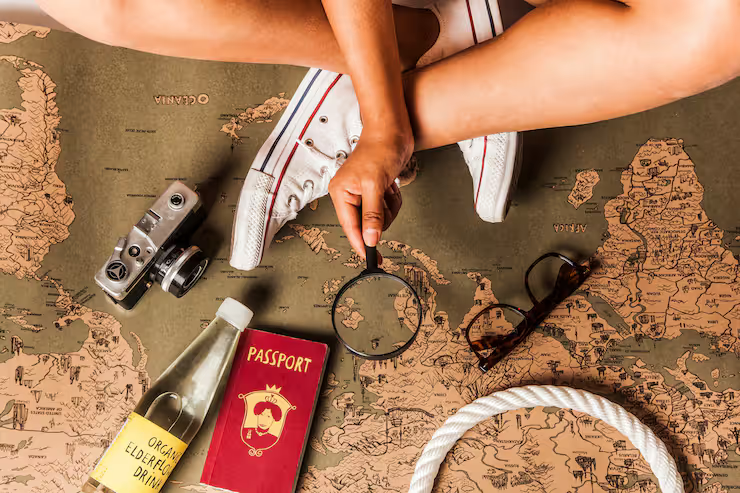Safe Travel Tips During Political Unrest | Essential Guide for Tourists
The journey involves navigating the destination where protests, state instability or civilian battles can occur. Such conditions may offer unexpected challenges for tourists, ranging from disturbed services to personal protection. This guide exists to help passengers inform, reduce the risk and help be safe while living abroad - even in an indefinite time.
Political instability not only affects local citizens, but also visits passengers. As stress increases, public transport can stop, airports can be closed, and Internet or mobile services can be banned. For tourists, it may not be able to be caught, misinformed information or help.

Importance
This topic means something today because:
-
People who run after the global journey return to unknown areas.
-
Some countries suddenly experience unrest, such as choices, protests or regional conflicts.
-
When things change on the ground, passengers require equipment for safety awareness to adapt their plans.
-
Family, single travelers, journalists, relief workers and professional professionals are particularly affected, as they can withstand increased risk in unstable areas.
Recent Travel and Security Trends in the Middle of the Turmoil (2024–2025)
Over the past year, many countries of citizens experienced unrested passengers. For example:
-
France (2024) witnessed mass protests, causing delays in transport and flying cancellation.
-
Israel and Gaza (the last half of 2023–2024) saw an increase in travel advice due to armed conflict.
-
Sri Lanka and Pakistan met political turmoil to stop, causing sudden banning and disturbance in the tourist plan.
Governments such as U.S., the United Kingdom, Canada and Australia have provided advice on rapidly up-to-date travel in real time, and several passengers rely on the embassy updates or apps that track local events. In addition, travel insurance providers have begun to offer more wider "CFAR" policies in response to demand.
Travel Law, Advice and Policy of Politically Unstable Regions
While traveling in or through or through it, many legal and political structures will play:
-
Government Council: U.S. (through the Ministry of Foreign Affairs) or British countries (through FCDO) release security levels from general precautions to "not travel". Their fracture can zero travel insurance.
-
Embassy services: Embassy offers emergency contact, withdrawal coordination and documentation services, but only for registered citizens.
-
Local law: Under unrest, laws can be strictly implemented - content sharing materials on protests, photography or social media can be limited or criminalized.
-
Airlines and travel providers: Airlines may allow flexible cancellation or reunification on the basis of consulting levels or confirmed security issues.
It is important to know if your destination has a curfew, limited field or military appearance, and adjust your plans accordingly.
Useful Travel Tools and Security Resources
Many digital and state equipment can help you monitor and adapt your journey during political unrest:
-
Smart Traveler Registration Program (STEP) - American citizens can get awake from embassies abroad.
-
Global Peace Index - provides data on security for countries globally.
-
International SOS and Worldwide-Misery-based travel safety information equipment.
-
Quotata - an app that provides real-time warning of outbreaks, protest and security issues.
-
Google Maps and Apple Maps - Live Transit can display updates and disruptions.
-
Travel insurance comparison platforms such as Squaremouth or inadequate inadequate in evaluating political withdrawal coverage.
Travel Checklist Before Entering Disturbance Areas
-
Passport and visa photocopy
-
Emergency contact list (local embassy, insurance, relative)
-
Disconnected map and translation tools
-
Backup of power supply for mobile devices
Frequently Asked Questions (Common Questions)
What should I do if I start disturbance after coming?
Stay indoors, monitor news from reliable sources, avoid protest areas and contact your local embassy. Always a safe withdrawal route and necessary goods are clear.
Is travel insurance useful during political turmoil?
Yes, but read the conditions for the policy carefully. Some guidelines cover the delay or cancellation caused by disturbance, while others did not. "Interrupt for some reason" (CFAR) are purchased with coverage.
Can I still travel if a government adviser is issued?
Yes, but it is not recommended. Advisors help passengers understand risk. If you ignore a consultant, you may lose support for cannons or zero insurance coverage.
Is protest always insecure for tourists?
Not all protests are violent, but stress can grow quickly. Foreigners can be done wrong as participants or accidentally targeted. Although they seem peaceful, avoid major meetings.
How can I prepare before I travel to a potentially unstable area?
Research on current events, signs up for the government's travel lights program, make physical copies of larger documents and keep in touch with your embassy.
Final Thoughts
During political turmoil, the journey requires extra awareness, flexibility and plan. With the right tools and mentality, it is possible to be informed even while experiencing the world and protecting your good. Understanding official advice, using reliable resources and being optimal can cause all differences between an obstructed journey and a safe, well-controlled journey.
